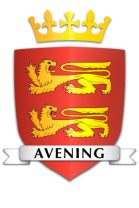

© Avening Parish Council 2023
“Preserve, Conserve, Enhance”
1 Frederick R POLLOCK
Frederick Robert Pollock was born on the 24th of October 1885 at 74 Queens Gate, Kensington, West London. He was the eldest son of Robert Erskine Pollock, an eminent barrister (later KC) and Mary Viner Pollock (née Playne). Mary was the daughter of Frederick Carl Playne (whose birth was registered in the Stroud District in 1837), a professional soldier, a captain in the Rifle Brigade. He died in 1864 in Canada, where Mary, his only child was born just three months earlier. Frederick Carl Playne owned the Avening Court Estate and Mary inherited this from her father. Avening Court was rented by the Hopkinson family up to the early 1880s, but it was after Robert Pollock’s marriage to Mary in 1884, and with the birth of their two sons in 1885 and 1888 that they took up an interest in the estate, sharing their time between Avening and West London. The whole family were “visitors” at Shrewsbury, Shropshire at the time of 1891 census, Avening Court and its Lower Lodge being “unoccupied”. At the time of the 1901 census, Frederick was at Eton College which he had entered in 1899 and remained there until Christmas 1903. He immediately entered the Military College, Sandhurst and in 1904 was offered a commission in the Coldstream Guards, being promoted to Lieutenant in June 1907. By that time, he had made such an impression on the Avening population that, at the time of his coming of age in 1906, the event was “celebrated in the village with much enthusiasm”. In 1910, his mother Mary died at their London home and Frederick inherited the Avening Court Estate. Between the end of 1909 and the early part of 1914, he did three tours of duty with the West Africa Frontier Force in Nigeria but rejoined the 1st Battalion of the Coldstream Guards in July 1914. He served with the Expeditionary Force from the outbreak of the war, sailing to France with the rest of his battalion on the 13th August and immediately being sent to Belgium, taking part in the retreat from Mons and the battles of the Marne and the Aisne. During the first battle of Ypres, he was killed at Langemark, dying instantly from an incoming shrapnel shell. He died on the 23rd of October 1914, the day before his 29th birthday. He was unmarried. He is buried at the St Julien Dressing Station Cemetery, where his grave is tended by the Commonwealth War Graves Commission. He is remembered on his parents’ grave in Avening churchyard and there is now a blue plaque in his honour on the house at Avening Court.
AveningArchive
WW1 Heroes





© Avening Parish Council 2023
AveningArchive
WW1 Heroes
1 Frederick R POLLOCK
Frederick Robert Pollock was born on the 24th of October 1885 at 74 Queens Gate, Kensington, West London. He was the eldest son of Robert Erskine Pollock, an eminent barrister (later KC) and Mary Viner Pollock (née Playne). Mary was the daughter of Frederick Carl Playne (whose birth was registered in the Stroud District in 1837), a professional soldier, a captain in the Rifle Brigade. He died in 1864 in Canada, where Mary, his only child was born just three months earlier. Frederick Carl Playne owned the Avening Court Estate and Mary inherited this from her father. Avening Court was rented by the Hopkinson family up to the early 1880s, but it was after Robert Pollock’s marriage to Mary in 1884, and with the birth of their two sons in 1885 and 1888 that they took up an interest in the estate, sharing their time between Avening and West London. The whole family were “visitors” at Shrewsbury, Shropshire at the time of 1891 census, Avening Court and its Lower Lodge being “unoccupied”. At the time of the 1901 census, Frederick was at Eton College which he had entered in 1899 and remained there until Christmas 1903. He immediately entered the Military College, Sandhurst and in 1904 was offered a commission in the Coldstream Guards, being promoted to Lieutenant in June 1907. By that time, he had made such an impression on the Avening population that, at the time of his coming of age in 1906, the event was “celebrated in the village with much enthusiasm”. In 1910, his mother Mary died at their London home and Frederick inherited the Avening Court Estate. Between the end of 1909 and the early part of 1914, he did three tours of duty with the West Africa Frontier Force in Nigeria but rejoined the 1st Battalion of the Coldstream Guards in July 1914. He served with the Expeditionary Force from the outbreak of the war, sailing to France with the rest of his battalion on the 13th August and immediately being sent to Belgium, taking part in the retreat from Mons and the battles of the Marne and the Aisne. During the first battle of Ypres, he was killed at Langemark, dying instantly from an incoming shrapnel shell. He died on the 23rd of October 1914, the day before his 29th birthday. He was unmarried. He is buried at the St Julien Dressing Station Cemetery, where his grave is tended by the Commonwealth War Graves Commission. He is remembered on his parents’ grave in Avening churchyard and there is now a blue plaque in his honour on the house at Avening Court.


























